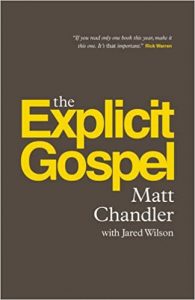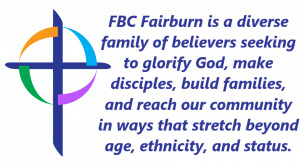Last week I stood outside at our church speaking with people who were waiting for their turn to receive food through our food pantry. I was having a conversation with a lady about church. It started with the light and airy discussion about when our church would re-gather and what we were doing in the meantime. It quickly turned to her church involvement and the approach our church takes to Scripture and serving others. She made this comment to me, “I am looking for a new church. I had to leave the church I was a member of for several years. The pastors we have had only want to talk about blessing and how to get your blessing, but they don’t want to tell us how to live like Jesus lived. I haven’t had a pastor in years tell me how to grow in my faith or what it means for me to serve others because God has blessed me.” In short what she was telling me is that her church had stopped preaching the Gospel of Jesus Christ.
Well, the sad reality is that many churches have stopped preaching the Gospel of Jesus Christ. Americans clamor for the relevant or the practical. Dying to self and denying the pleasures of the world isn’t the sexy approach to life that the world around us drives. So, a lot of Sundays pass and churchgoers across this nation hear messages that could have been taken from the self-help section of Barnes and Noble or lifted from an idea read in the “Dear Abby” column of the newspaper. It is not that we shouldn’t have a practical approach to Scripture, it is that the Gospel should drive the application. This is not a churched up 10 ways to have obedient kids or the 7 biblical values of weight loss.
 In The Explicit Gospel, Matt Chandler hits that exact point. Centering his approach on 1 Corinthians 15:3, the drive of this book is to call churches and Christians back to things that are of “first importance.” This was what Paul spoke of in his ministry in Corinth. What if our churches and what if our lives as Christians were focused on matters of first importance? In order for us to get there, we have to explore the fullness of the Gospel in our daily lives.
In The Explicit Gospel, Matt Chandler hits that exact point. Centering his approach on 1 Corinthians 15:3, the drive of this book is to call churches and Christians back to things that are of “first importance.” This was what Paul spoke of in his ministry in Corinth. What if our churches and what if our lives as Christians were focused on matters of first importance? In order for us to get there, we have to explore the fullness of the Gospel in our daily lives.
This book takes the Gospel in three parts. First, Chandler explores the Gospel on the ground. This is an in depth exploration of why we have the Gospel. It starts with God. Not just a cool grandpa in the sky, but what does it mean that God is holy? What does it mean that God is glorious? As we look at the Gospel and the work of Christ on the Cross, Chandler makes this observation, “The deeper we go into God’s glory, the deeper we will find ourselves in the work of Christ on the Cross, and vice versa.”[1] It is in this draw of the Cross to God’s glory that we find our amazing God being worshiped. The truth is we are created to worship something and through the Cross, we see God’s glory and we worship Him. This is how God designed us to function, but it is not just a show up on Sunday and sing. Christian worship is the core of walking with God and serving Him in all things. “The root of Christian worship, then, is acknowledging, submitting to, and enjoying the supremacy of God’s glory. In all things.”[2]
It is through an our picture of God and His glory that we find the insufficiencies of man and our outright sinfulness. We find that His holiness actually makes our sin more apparent. Let’s face it, we might not look so bad against someone else. But other people are not the measuring stick; He is! All that we earned or got on our own is hell. We all deserve hell. We all deserve “the absence of God’s goodness and blessedness…the absence of anything we can think of that’s good, right, comforting, joyous, happy, and peaceful.”[3] This may sound severe, but it is the rightful contrast of our sinfulness against His holiness. Or, as Chandler says “We have to feel the weight of God’s severity, because without feeling the weight of His severity, we won’t know the weight of His kindness, and we won’t be able to worship Him and Him alone.”[4] That is why the Gospel doesn’t stop with what we did wrong; it is the revealing of how He fixes it. The Gospel on the ground takes us to Christ and the Cross. He starts with God and then goes to man in order for us to see the contrast between His holiness and our sinfulness.
The second section of the book takes the aerial view of the Gospel. This approach does not focus on our individuality as Christians, which is normally the focus we want to take. This is “a tour de force story of creation, fall, reconciliation, consummation—a grand display of God’s glory in His overarching purposes of subjecting all things to the supremacy of Christ.”[5] The basic thrust of chapters on creation, fall, reconciliation, and consummation take us from Genesis 1 and the God Who has created all things to Revelation 22, when God makes all things new. What was the purpose of everything that has been made and, ultimately, the Cross? Do they work together? In other words, “the context of the Gospel message is not our benefit or our salvation; the context of the Gospel is the supremacy of Christ and the glory of God. This story of the good news is personal, but is also cosmic.”[6] Jesus states in Revelation 21.5, “Behold, I am making all things new.”[7] We see that “all things” comes as this earth is gone and the new heaven and new earth have appeared.
Through the fall, Adam brought a system of death into God’s perfect creation. Things have been broken ever since. We are reconciled to Him through the Gospel, but it is because God is redeeming creation…all of it! But, how does that happen and what responsibility do we have with it? Reconciliation calls us to action. “For the reconciliation enacted by the Cross to be cosmic, then, it must encompass more than just our individual relationship with God. We each may be saved as an individual life, but we are not saved to an individual life. We stand as part of God’s restoring of all things, we are brought into the missional witness of God’s restorative gospel, the body of Christ.”[8] This means that the Church is here to be a reconciling force of the lost to the God Who saves. That changes the approach to church. It’s not about me and it’s not about you, it’s about Him!
In a balanced approach, Matt Chandler takes one final section to make some considerations for each section with warnings. First, if we stay on the ground too long in the Gospel, then we will get bogged down in deep theology that never comes to the heart of people who need it. Second, if we take the Gospel in the air too long, we will focus on the social and physical ills of serving without rooting it in the work of Christ and the salvation that the world needs. In order to operate in the fullness of the Gospel, we must tether ourselves to both through the local church.
Think about the lady I spoke with last week. What she wants is to know what the Gospel means and what the Gospel does. That is the explicit nature of the work of Christ in us, in our community, and across history. Take time to read this work and grow as a follower of Christ.
This book is available on Amazon: https://tinyurl.com/ybwhp29w

[1] Matt Chandler, The Explicit Gospel (Wheaton, Ill: Crossway, 2012), 21.
[2] Chandler, 36. Italics in original.
[3] Chandler, 44.
[4] Chandler, 51.
[5]Chandler, 16.
[6] Chandler, 90.
[7] Scripture quotations taken from the NASB. Copyright by The Lockman Foundation, 1995. www.lockman.org
[8] Chandler, 143.
